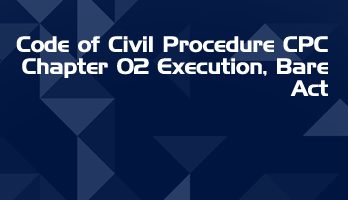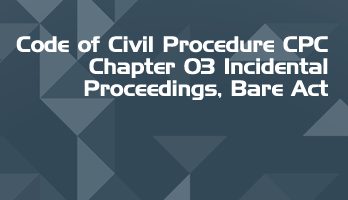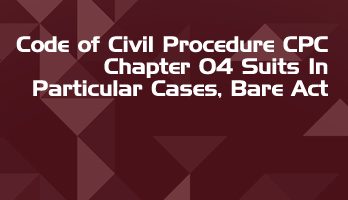A 'Bare act' is the actual legislation passed by the Parliament of India. Generally, an act sets out the high level legal and policy principles applicable to the subject matter of the law.
Most acts are accompanied by 'subsidiary legislation' such as rules, regulations, notifications and orders; which address the actual implementation detail of the act.
Free Full Course Available on LawMint's YouTube Channel
How to Land Your Dream LLB Internship in a Top Law Firm
- Part 1 - Introduction
- Part 2 - Internship Planning
- Part 3 - Internship Research
- Part 4 - Building Your Profile
- Part 5 - The Email
- Part 6 - The Resume
- Part 7 - The Cover Letter
- Part 8 - The Interview
- Part 9 - Self Development
Practical and comprehensive course, with real examples and step-by-step analysis of the complete internship application process. Check out LawMint's YouTube channel now!
Code of Criminal Procedure, 1973
Chapter 18 – Trial Before A Court Of Session
Section 225 – Trial to be conducted by Public Prosecutor
In every trial before a Court of Session, the prosecution shall be conducted by a Public Prosecutor.
Section 226 – Opening case for prosecution
When the Accused appears or is brought before the Court in pursuance of a commitment of the case under section 209, the prosecutor shall open his case by describing the charge brought against the accused and stating by what evidence he proposes to prove the guilt of the accused.
Section 227 – Discharge
If, upon consideration of the record of the case and the documents submitted therewith, and after hearing the submissions of the accused and the prosecution in this behalf, the Judge considers that there is not sufficient ground for proceeding against the accused, he shall discharge the accused and record his reasons for so doing.
Section 228 – Framing of charge
- If, after such consideration and hearing as aforesaid, the Judge is of opinion that there is ground for presuming that the accused has committed an offence which –
- is not exclusively triable by the Court of Session, he may, frame a charge against the accused and, by order, transfer the case for trial to the Chief Judicial Magistrate or any other Judicial Magistrate of the first class and direct the accused to appear before the Chief Judicial Magistrate, or, as the case may be, the Judicial Magistrate of the first class, on such date as he deems fit, and thereupon such Magistrate shall try the offence in accordance with the procedure for the trial of warrant – cases instituted on a police report;
- is exclusively triable by the Court, he shall frame in writing a charge against the accused.
- Where the Judge frames any charge under clause (b) of Sub – Section (1), the charge shall be read and explained to the accused and the accused shall be asked whether he pleads guilty of the offence charged or claims to be tried.
Section 229 – Conviction on plea of guilty
If the accused pleads guilty, the Judge shall record the plea and may, in his discretion, convict him thereon.
Section 230 – Date for prosecution evidence
If the accused refuses to plead, or does not plead, or claims to be tried or is not convicted under section 229, the Judge shall fix a date for the examination of witnesses, and may, on the application of the prosecution, issue any process for compelling the attendance of any witness or the production of any document or other thing.
Section 231 – Evidence for prosecution
- On the date so fixed, the Judge shall proceed to take all such evidence as may be produced in support of the prosecution.
- The Judge may, in his discretion, permit the cross – examination of any witness to be deferred until any other witness or witnesses have been examined or recall any witness for further cross – examination.
Section 232 – Acquittal
If after taking the evidence for the prosecution, examining the accused and hearing the prosecution and the defence on the point, the Judge considers that there is no evidence that the accused committed the offence, the judge shall record an order of acquittal.
Section 233 – Entering upon defence
- Where the accused is not acquitted under section 232 he shall be called upon to enter on his defence and adduce any evidence he may have in support thereof.
- If the accused puts in any written statement, the Judge shall file it with the record.
- If the accused applies for the issue of any process for compelling the attendance of any witness or the production of any document or thing, the Judge shall issue such process unless he considers, for reasons to be recorded, that such application should be refused on the ground that it is made for the purpose of vexation or delay or for defeating the ends of justice.
Section 234 – Arguments
When the examination of the witnesses (if any) for the defence is complete, the prosecutor shall sum up his case and the accused or his pleader shall be entitled to reply: Provided that where any point of law is raised by the accused or his pleader, the prosecution may, with the permission of the Judge, make his submissions with regard to such point of law.
Section 235 – Judgment of acquittal or conviction
- After hearing arguments and points of law (if any), the Judge shall give a judgment in the case.
- If the accused is convicted, the Judge shall, unless he proceeds in accordance with the provisions of section 360 hear the accused on the question of sentence, and then pass sentence on him according to law.
Section 236 – Previous conviction
In a case where a previous conviction is charged under the provisions of Sub – Section (7) of section 211, and the accused does not admit that he has been previously convicted as alleged in the charge, the Judge may, after he has convicted the said accused under section 229 or section 235, take evidence in respect of the alleged previous conviction, and shall record a finding thereon: Provided that no such charge shall be read out by the Judge nor shall the accused be asked to plead thereto nor shall the previous conviction be referred to by the prosecution or in any evidence adduced by it, unless and until the accused has been convicted under section 229 or section 235.
Section 237 – Procedure in cases instituted under section 199(2)
- A Court of Session taking cognizance of an offence under Sub – Section (2) of section 199 shall try the case in accordance with the procedure for the trial of warrant – cases instituted otherwise than on a police report before a Court of Magistrate: Provided that the person against whom the offence is alleged to have been committed shall, unless the Court of Session, for reasons to be recorded, otherwise directs, be examined as a witness for the prosecution.
- Every trial under this section shall be held in camera if either party thereto so desires or if the Court thinks fit so to do.
- If, in any such case, the Court discharges or acquits all or any of the accused and is of opinion that there was no reasonable cause for making the accusation against them or any of them, it may, by its order of discharge or acquittal, direct the person against whom the offence was alleged to have been committed (other than the President, Vice – President or the Governor of a State or the Administrator of a Union Territory) to show cause why he should not pay compensation to such accused or to each or any of such accused, when there are more than one.
- The Court shall record and consider any cause which may be shown by the person so directed, and if it is satisfied that there was no reasonable cause for making the accusation, it may, for reasons to be recorded, make an order that compensation to such amount not exceeding one thousand rupees, as it may determine, be paid by such person to the accused or to each or any of them.
- Compensation awarded under Sub – Section (4) shall be recovered as if it were a fine imposed by a Magistrate.
- No person who has been directed to pay compensation under Sub – Section (4) shall, by reason of such order, be exempted from any civil or criminal liability in respect of the complaint made under this section: Provided that any amount paid to an accused person under this section shall be taken into account in awarding compensation to such person in any subsequent civil suit relating to the same matter.
- The person who has been ordered under Sub – Section (4) to pay compensation may appeal from the order, in so far as it relates to the payment of compensation, to the High Court.
- When an order for payment of compensation to an accused person is made, the compensation shall not be paid to him before the period allowed for the presentation of the appeal has elapsed or, if an appeal is presented, before the appeal has been decided.
Important Central Acts in Regional Languages
Legislative department website also features regional language versions of several important Central Acts.
Free Full Course Available on LawMint's YouTube Channel
How to Land Your Dream LLB Internship in a Top Law Firm
- Part 1 - Introduction
- Part 2 - Internship Planning
- Part 3 - Internship Research
- Part 4 - Building Your Profile
- Part 5 - The Email
- Part 6 - The Resume
- Part 7 - The Cover Letter
- Part 8 - The Interview
- Part 9 - Self Development
Practical and comprehensive course, with real examples and step-by-step analysis of the complete internship application process. Check out LawMint's YouTube channel now!












